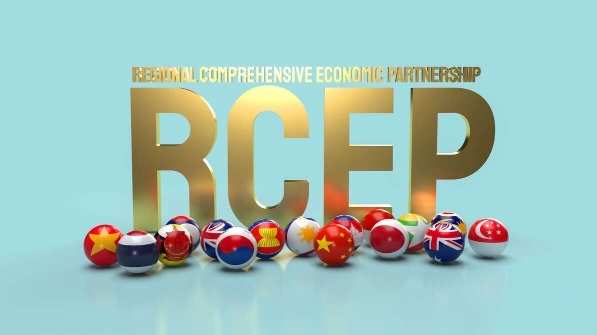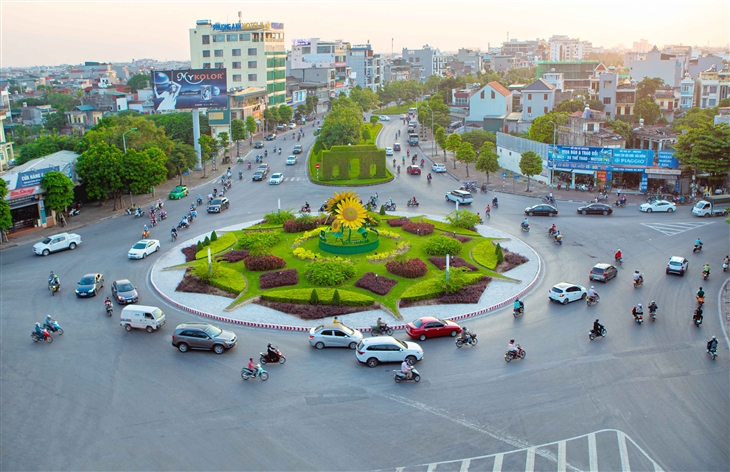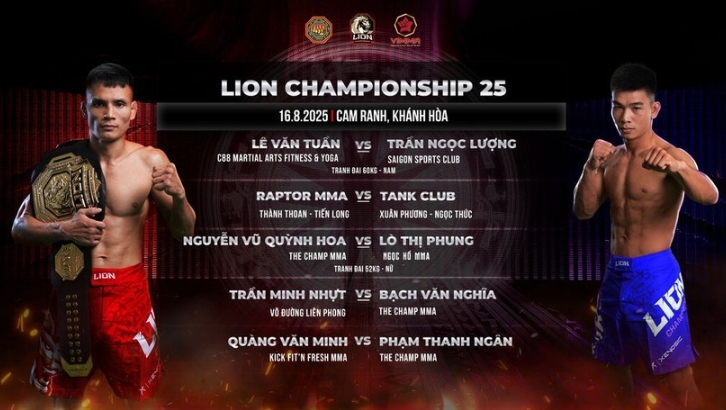Taking advantage of RCEP to exploit billion-dollar Halal market
Monday, September 29,2025
AsemconnectVietnam - RCEP not only opens up more export opportunities but also lays the foundation for exploiting specific industries, including Halal industry worth trillions of USD.
"Export gold mine"
In context of increasingly deep international economic integration, new-generation free trade agreements (FTAs) have become an important driving force to help economies expand their markets, promote investment and participate deeply in global value chain. In particular, Regional Comprehensive Economic Partnership Agreement (RCEP Agreement) with the participation of 10 ASEAN countries and 5 partners: China, Japan, Korea, Australia and New Zealand is considered the largest FTA in the world today. According to Mr. Tran Thanh Hai, Deputy Director of Import-Export Department, Ministry of Industry and Trade, after more than 3 years of implementation, RCEP has brought about many clear results. Vietnamese goods benefit from tariff reductions, more favorable customs procedures and flexible rules of origin. Agricultural, aquatic, textile and wooden products sectors have recorded growth thanks to ability to access large, diverse markets with fewer barriers.
Notably, RCEP not only opens up more export opportunities but also lays foundation for exploiting and entering supply chain of specific industries, including Halal industry worth trillions of USD. According to global Islamic economic report, Halal food spending is estimated to reach 7,700 billion USD in 2025 and is expected to increase to 10,000 billion USD in 2028.
In RCEP bloc alone, Halal market potential is very open, many countries have a large demand for importing Halal products such as Indonesia, Malaysia, the Philippines and Singapore. Japan and South Korea are also expanding consumption of Halal goods to serve Muslim community and tourists. These are markets that Vietnam is fully capable of meeting if it proactively invests in improving quality and meeting international standards.
"Exploiting Halal market will help increase export turnover, promote transformation of Vietnam's agriculture, processing industry and logistics towards a more modern and professional direction. At the same time, this is an opportunity for Vietnamese goods to position their brands and enhance their reputation in global market," Mr. Tran Thanh Hai emphasized.
What do Vietnamese businesses need to prepare?
Associate Professor, Dr. Dinh Cong Hoang, Institute of South Asia, West Asia and Africa Studies, Vietnam Academy of Social Sciences, said that Vietnam has many advantages to develop Halal industry thanks to its geographical location near major consumer markets. Products such as seafood, vegetables, rice, coffee, tea, pepper, cashews, rubber and spices... are all strengths of Vietnam, capable of meeting the needs of Muslim consumers.
In process of deep integration, Vietnam has signed many FTAs with Islamic countries, thereby creating favorable conditions for domestic enterprises to take advantage of tariff incentives, expand access and penetrate deeper into the potential Halal market.
In particular, Vietnam Halal Certification Agency (HCA) has been officially recognized by Islamic Development Agency of Malaysia (JAKIM). This is considered an important key to help Vietnamese products meet international Halal standards and easily penetrate the distribution system in Malaysia as well as many other Islamic countries.
According to Pham The Cuong, Trade Counselor, Vietnam Trade Office in Indonesia, with 87% of population following Islam, Indonesia is currently the largest Halal product consumer market in ASEAN. Size of Halal industry in this country is forecast to reach 282 billion USD by 2025, accounting for more than 11% of total global Halal spending.
In recent years, Vietnamese goods have increasingly appeared in Indonesian market. Continuous growth in export turnover has created a foundation for Vietnamese enterprises to expand their position, especially in Halal product segment.
Representative of Vietnam Trade Office in Indonesia also said that Halal market in Indonesia still has a lot of room for Vietnamese enterprises to exploit. However, big challenge is that most domestic enterprises do not fully understand specific requirements and are still hesitant to invest in achieving Halal certification.
To take advantage of opportunity, enterprises need to proactively register for Indonesian Halal certification as well as the national standard SNI; cooperate with Halal enterprises to develop; actively participate in major international fairs and exhibitions in Indonesia; cooperate with domestic distribution systems and strongly exploit e-commerce platforms. At the same time, enterprises also need to closely coordinate with domestic authorities to promptly remove difficulties, facilitating process of penetrating and expanding their position in this potential market.
Ms. Nguyen Thi Quy Linh, Director of F&G Vietnam Food Co., Ltd. (Hanoi), a company that has successfully exported to Muslim market for many years, said that the first experience to penetrate is to have Halal certification. Since 2018-2019, F&G Vietnam has proactively applied for this certification and become one of the few pioneering businesses, considering it as a "passport" to approach Muslim consumers.
According to Ms. Linh, recently signed FTAs have opened up many advantages in reducing tariffs and simplifying procedures, making it easier for Vietnamese goods with Halal certification to be exported. She emphasized that businesses need to take advantage of opportunity instead of worrying about Halal standards being too strict or costs being too high. "Every standard has its own requirements, with difficulties and advantages. Vietnam is currently behind many countries in exploiting the Halal market. If we hesitate, we will be left behind even more," Ms. Linh said.
Source: Vitic/ congthuong.vn
In context of increasingly deep international economic integration, new-generation free trade agreements (FTAs) have become an important driving force to help economies expand their markets, promote investment and participate deeply in global value chain. In particular, Regional Comprehensive Economic Partnership Agreement (RCEP Agreement) with the participation of 10 ASEAN countries and 5 partners: China, Japan, Korea, Australia and New Zealand is considered the largest FTA in the world today. According to Mr. Tran Thanh Hai, Deputy Director of Import-Export Department, Ministry of Industry and Trade, after more than 3 years of implementation, RCEP has brought about many clear results. Vietnamese goods benefit from tariff reductions, more favorable customs procedures and flexible rules of origin. Agricultural, aquatic, textile and wooden products sectors have recorded growth thanks to ability to access large, diverse markets with fewer barriers.
Notably, RCEP not only opens up more export opportunities but also lays foundation for exploiting and entering supply chain of specific industries, including Halal industry worth trillions of USD. According to global Islamic economic report, Halal food spending is estimated to reach 7,700 billion USD in 2025 and is expected to increase to 10,000 billion USD in 2028.
In RCEP bloc alone, Halal market potential is very open, many countries have a large demand for importing Halal products such as Indonesia, Malaysia, the Philippines and Singapore. Japan and South Korea are also expanding consumption of Halal goods to serve Muslim community and tourists. These are markets that Vietnam is fully capable of meeting if it proactively invests in improving quality and meeting international standards.
"Exploiting Halal market will help increase export turnover, promote transformation of Vietnam's agriculture, processing industry and logistics towards a more modern and professional direction. At the same time, this is an opportunity for Vietnamese goods to position their brands and enhance their reputation in global market," Mr. Tran Thanh Hai emphasized.
What do Vietnamese businesses need to prepare?
Associate Professor, Dr. Dinh Cong Hoang, Institute of South Asia, West Asia and Africa Studies, Vietnam Academy of Social Sciences, said that Vietnam has many advantages to develop Halal industry thanks to its geographical location near major consumer markets. Products such as seafood, vegetables, rice, coffee, tea, pepper, cashews, rubber and spices... are all strengths of Vietnam, capable of meeting the needs of Muslim consumers.
In process of deep integration, Vietnam has signed many FTAs with Islamic countries, thereby creating favorable conditions for domestic enterprises to take advantage of tariff incentives, expand access and penetrate deeper into the potential Halal market.
In particular, Vietnam Halal Certification Agency (HCA) has been officially recognized by Islamic Development Agency of Malaysia (JAKIM). This is considered an important key to help Vietnamese products meet international Halal standards and easily penetrate the distribution system in Malaysia as well as many other Islamic countries.
According to Pham The Cuong, Trade Counselor, Vietnam Trade Office in Indonesia, with 87% of population following Islam, Indonesia is currently the largest Halal product consumer market in ASEAN. Size of Halal industry in this country is forecast to reach 282 billion USD by 2025, accounting for more than 11% of total global Halal spending.
In recent years, Vietnamese goods have increasingly appeared in Indonesian market. Continuous growth in export turnover has created a foundation for Vietnamese enterprises to expand their position, especially in Halal product segment.
Representative of Vietnam Trade Office in Indonesia also said that Halal market in Indonesia still has a lot of room for Vietnamese enterprises to exploit. However, big challenge is that most domestic enterprises do not fully understand specific requirements and are still hesitant to invest in achieving Halal certification.
To take advantage of opportunity, enterprises need to proactively register for Indonesian Halal certification as well as the national standard SNI; cooperate with Halal enterprises to develop; actively participate in major international fairs and exhibitions in Indonesia; cooperate with domestic distribution systems and strongly exploit e-commerce platforms. At the same time, enterprises also need to closely coordinate with domestic authorities to promptly remove difficulties, facilitating process of penetrating and expanding their position in this potential market.
Ms. Nguyen Thi Quy Linh, Director of F&G Vietnam Food Co., Ltd. (Hanoi), a company that has successfully exported to Muslim market for many years, said that the first experience to penetrate is to have Halal certification. Since 2018-2019, F&G Vietnam has proactively applied for this certification and become one of the few pioneering businesses, considering it as a "passport" to approach Muslim consumers.
According to Ms. Linh, recently signed FTAs have opened up many advantages in reducing tariffs and simplifying procedures, making it easier for Vietnamese goods with Halal certification to be exported. She emphasized that businesses need to take advantage of opportunity instead of worrying about Halal standards being too strict or costs being too high. "Every standard has its own requirements, with difficulties and advantages. Vietnam is currently behind many countries in exploiting the Halal market. If we hesitate, we will be left behind even more," Ms. Linh said.
Source: Vitic/ congthuong.vn
Vietnam domestic steel market – September 2025
Vietnam domestic animal feed market – September 2025
Vietnam Fertilizer Market – September 2025
Assessing the impact of the EVFTA agreement on Vietnam's coffee exports to the EU in the first 5 months of 2025
Exports to Netherlands reached over 8.6 billion USD in 8 months of 2025
Wheat imports worth over 1.02 billion USD in 8 months of 2025
Vietnam to achieve target of 65 billion USD in agricultural, forestry and fishery exports
Vietnam - Singapore trade turnover reached nearly 26 billion SGD
Fruit and vegetable exports accelerate towards a record of 8 billion USD
Corn imports reached nearly 1.73 billion USD in 8 months of 2025
The multi-billion dollar industry seeks strategic direction in RCEP
RCEP creates a 'new wind' for Vietnam's pangasius exports
Main commodity groups exported to South Korea in 8 months of 2025
Exports to Japan in the first 8 months of 2025 increased

Plan of Hai Duong province for a period of 2021 - 2030, ...
Organize space reasonably and harmoniously, focusing on connecting Hai Duong in common development space, actively contributing to the ...Plan of Hau Giang province in a period of 2021 - 2030, ...
Sustainable forestry development program in a period of ...

LION Championship 25 to feature title showdowns in Khanh ...
LION Championship 25 will take place at Cam Ranh Square in south-central Khanh Hoa province, at 20:00 on August 16, featuring two of the ...Bai Dinh Pagoda named outstanding destination with ...
Party chief attends special political–art programme “Under ...



